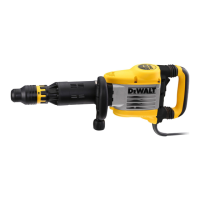ENGLISH
4
Minimum Gauge for Cord Sets
Volts
Total Length of Cord in Feet
(meters)
120 V 25 (7.6) 50 (15.2) 100 (30.5) 150 (45.7)
240 V 50 (15.2) 100 (30.5) 200 (61.0) 300 (91.4)
Ampere Rating
American Wire Gauge
More
Than
Not
More
Than
0 6 18 16 16 14
6 10 18 16 14 12
10 12 16 16 14 12
12 16 14 12 Not Recommended
The label on your tool may include the following symbols. The
symbols and their definitions are asfollows:
V ......................... volts
Hz .......................hertz
min ..................... minutes
or DC ......direct current
...................... Class I Construction
(grounded)
…/min ..............per minute
BPM ....................beats per minute
IPM ..................... impacts per minute
RPM .................... revolutions per
minute
sfpm ................... surface feet per
minute
SPM .................... strokes per minute
A ......................... amperes
W ........................watts
or AC ...........alternating current
or AC/DC .... alternating or
direct current
...................... Class II
Construction
(double insulated)
n
o
.......................no load speed
n .........................rated speed
......................earthing terminal
.....................safety alert symbol
.....................visible radiation
..................... wear respiratory
protection
..................... wear eye
protection
..................... wear hearing
protection
..................... read all
documentation
SAVE THESE INSTRUCTIONS FOR
FUTURE USE
Motor
Be sure your power supply agrees with the nameplate
marking. Voltage decrease of more than 10% will cause loss
of power and overheating.
tools are factory tested;
if this tool does not operate, check powersupply.
COMPONENTS (FIG. A)
WARNING: Never modify the power tool or any part
of it. Damage or personal injury couldresult.
Refer to Figure A at the beginning of this manual for a
complete list ofcomponents.
Intended Use
Your heavy‑duty demolition hammer is designed for
professional demolition, chipping and chasing applications
in concrete, brick, stone and other masonrymaterials.
DO NOT use under wet conditions or in presence of
flammable liquids orgases.
Your heavy‑duty demolition hammer is a professional
powertool.
DO NOT let children come into contact with the tool.
Supervision is required when inexperienced operators use
thistool.
Soft Start Feature
The soft start feature allows the impact rate to build up
more slowly, thus preventing the chisel or point from
“bouncing” around on the masonry when startingup.
Active Vibration Control
The active vibration control neutralizes rebound vibration
from the hammer mechanism. Lowering hand and arm
vibration, it allows more comfortable use for longer periods
of time and extends the life of theunit.
ASSEMBLY AND ADJUSTMENTS
WARNING: To reduce the risk of serious personal
injury, turn unit off and disconnect it from
power source before making any adjustments or
removing/installing attachments or accessories.
An accidental start‑up can causeinjury.
Bail/Loop Style Auxiliary Handle (Fig. B)
WARNING: To reduce the risk of personal injury,
ALWAYS operate the tool with the bail/loop style
auxiliary handle properly installed. Failure to do so
may result in the bail/loop style auxiliary handle
slipping during tool operation and subsequent
loss of control. Hold tool with both hands to
maximizecontrol.
The bail/loop style auxiliary handle
5
clamps to the front of
the gear case and may be rotated 360˚ to permit right‑ or
left‑handuse.
Mounting the Bail/Loop Style Auxiliary
Handle (Fig. B)
1. Widen the ring opening
8
of the bail/loop style
auxiliary handle
5
by rotating the screw for handle
mounting
6
counterclockwise.
2. Slide the assembly onto the nose of the tool through
the ring opening
8
and onto the chisel position index
collar
3
, past the chisel holder andsleeve.
3. Rotate the bail/loop style auxiliary handle to the
desiredposition.
4. Lock the bail/loop style auxiliary handle in place by
securely tightening the screw for handle mounting
6
rotating it clockwise so that the assembly will notrotate.

